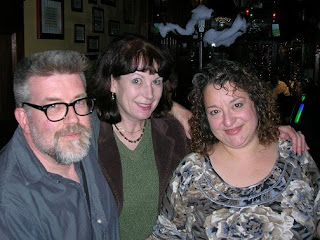Out of the Past (1947) 10/10
Jeff Bailey (Robert Mitchum) owns a small-town gas station and woos a small-town girl, until a man from his past pulls him back into a life of deception and danger. Directed by Jacques Tourneur.
Five years ago, I broke my knee and spent four or five days in the hospital, during which, not surprisingly, I watched quite a lot of television, including a showing of Out of the Past. i didn’t much care for the movie, I found it disjointed and corny. Turns out I took an awful lot of Demerol and Percoset during those four or five days, and that may have affected my perception.
Out of the Past is a perfect film noir, hitting all the classic themes in exactly the right way. The femme fatale (Jane Greer) is beautiful and dangerous, the hero is witty and insouciant, yet cannot escape the hand of fate, and the shadows of night and the city are sharply contrasted with the sunshine of small town decency.
The first thing I noticed was the construction and pacing. Every beat hits at exactly the right moment. A dark stranger arrives in a small town. We hear about the hero before we see him, and then move away from darkness into light; Jeff and Ann (Virginia Huston) fishing at a secluded lake, and then embracing, and then discussing marriage, and only then does Jeff’s deaf employee (Dickie Moore) intrude with news of the stranger’s arrival.
Kathie Moffat, the femme fatale, is also introduced in conversation. Before we ever meet her, we know she’s shot Whit (Kirk Douglas), her powerful lover. Whatever we know of her afterwards, we are not to forget that she is capable of attempted murder, perhaps to steal forty thousand dollars, perhaps just to get away.
Whit wants Kathie back, and hires Jeff, at that time a private detective, to find her. Jeff follows her trail to Acapulco, his fascination growing, and we still have not yet seen Kathie onscreen. Before she appears, we know what will happen when she does. It’s inevitable: Jeff falls for Kathy and deceives Whit into believing he has not found her.
The introduction of the two principles are a perfect parallel. Jeff in an innocent, natural and loving setting, but haunted; Kathie in the midst of a deception, seductive and manipulative. Kathie is a trap, and Jeff is caught in it.
The film catches us up with Jeff’s past by means of his confession to Ann, then we are in the present with Jeff seeing Whit for the first time since betraying him. Late in the movie, we return to Ann’s small town to check in with events there, and it is startling how bright the sun shines there. Yes, we’ve been to Acapulco and Lake Tahoe, but the sun is only beautiful in Bridgeport; Jeff’s past-become-present is one long shadow.
Out of the Past is very interested in showing us goodness and evil, and contrasting them, but carefully notes that they don’t produce different results. At one point Kathie tells Jeff that she’s no good, and so is he, and that’s why they belong together. It struck me pretty powerfully in that moment, that Jeff had shown no real sign of being no good, except for falling for Kathie. Even when he betrayed Whit, he refused to take Whit’s payment. His only crime (as in, felony) was in covering up a worse crime of Kathie’s. We see from the start that he is honest with Ann, and even Whit says that he’s hired Jeff because he has a reputation for being both smart and honest. Maybe it’s “smart” that dooms him.
Every performance here is perfection. Mitchum is powerful, watching the world from under his dreamy eyelids, yet still entrapped by it. Kirk Douglas is excellent as a wealthy man who pulls every string, and Jane Greer is captivating. The plot and characterization strongly resemble The Maltese Falcon, but that doesn’t detract from the film.
The whole thing works together: Acting, directing, cinematography, wit, sensuality, morality, and the dark shadow of film noir falling over it all.



